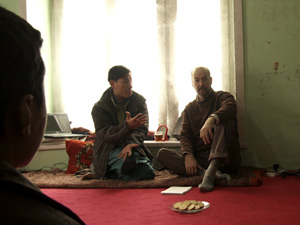AUCKLAND (Māori Television /Pacific Media Watch): New Zealand's military engagement in Afghanistan is the subject of a challenging documentary due to screen on Māori Television on the eve of Anzac Day.
He Toki Huna: New Zealand in Afghanistan explores New Zealand's involvement in Afghanistan – the longest ever war in which this country has played a part.
Commissioned by Māori Television and directed and produced by award-winning filmmakers Annie Goldson (Brother Number One, An Island Calling) and Kay Ellmers (Canvassing the Treaty, Polynesian Panthers) through Occasional Productions, the documentary gives an overview of the engagement, and backgrounds some of Afghanistan’s turbulent history to provide context to the post 9/11 invasion.
Dr Goldson said the documentary sheds light on our recent past and holds valuable lessons for the future.
"By joining in the war post-911, have we been 'good global citizens' fighting the good fight against international terrorism? Or did New Zealand enter into an alliance that has meant our soldiers have been actively and militarily involved in a complex conflict that most of us know little about and have not agreed to participate in?”
Dr Goldson said most New Zealanders’ knowledge of our military engagement in Afghanistan will have been acquired through “embedded” media reports that have been carefully controlled.
Deliberate timing
She added that the timing of the documentary premiere was very deliberate.
“We’ve been making the film over the past two years and were always planning to release it as New Zealand troops withdrew, thus providing an overview and analysis of New Zealand's involvement in Afghanistan.” He Toki Huna (The Hidden Adze) takes viewers on the ground in Afghanistan with independent New Zealand journalist Jon Stephenson as he seeks eyewitness accounts of incidents involving New Zealand troops, and interviews soldiers who have served on the front line in Afghanistan.
He Toki Huna (The Hidden Adze) takes viewers on the ground in Afghanistan with independent New Zealand journalist Jon Stephenson as he seeks eyewitness accounts of incidents involving New Zealand troops, and interviews soldiers who have served on the front line in Afghanistan.
“The film does pose some uncomfortable questions about the political motivations that sent young New Zealand men and women to battle in a very ill-defined war against an unclear and shifting ‘enemy’, supporting a new Afghan ‘state’ with little support amongst its own population,” fellow director/producer Kay Ellmers said.
“Most importantly, unlike most other media coverage to date, we hear from Afghans themselves, did they want us there, and what has our presence achieved?
“We give voice to the indigenous population and seek their analysis of New Zealand’s presence in their homeland.”
Māori Television general manager of programming Haunui Royal said He Toki Huna: New Zealand in Afghanistan is an important documentary that all New Zealanders should see.
“We hope that it will generate meaningful discussion and encourage Kiwis to talk about the reasons behind New Zealand’s decision to send troops to Afghanistan. Many of those who died while serving in Afghanistan were Māori so the documentary will also serve as a powerful reminder of the huge sacrifices our soldiers and their whanau have made over the past 10 years.”
He Toki Huna: New Zealand in Afghanistan premieres on Māori Television on Wednesday 24 April at 8.30pm.
It was funded through NZ on Air with generous support from the University of Auckland. Māori Television will once again dedicate its programming schedule on Thursday, April 25, to ANZAC Day.
More information:
This work is licensed under a Creative Commons Attribution-NonCommercial 3.0 New Zealand Licence.




